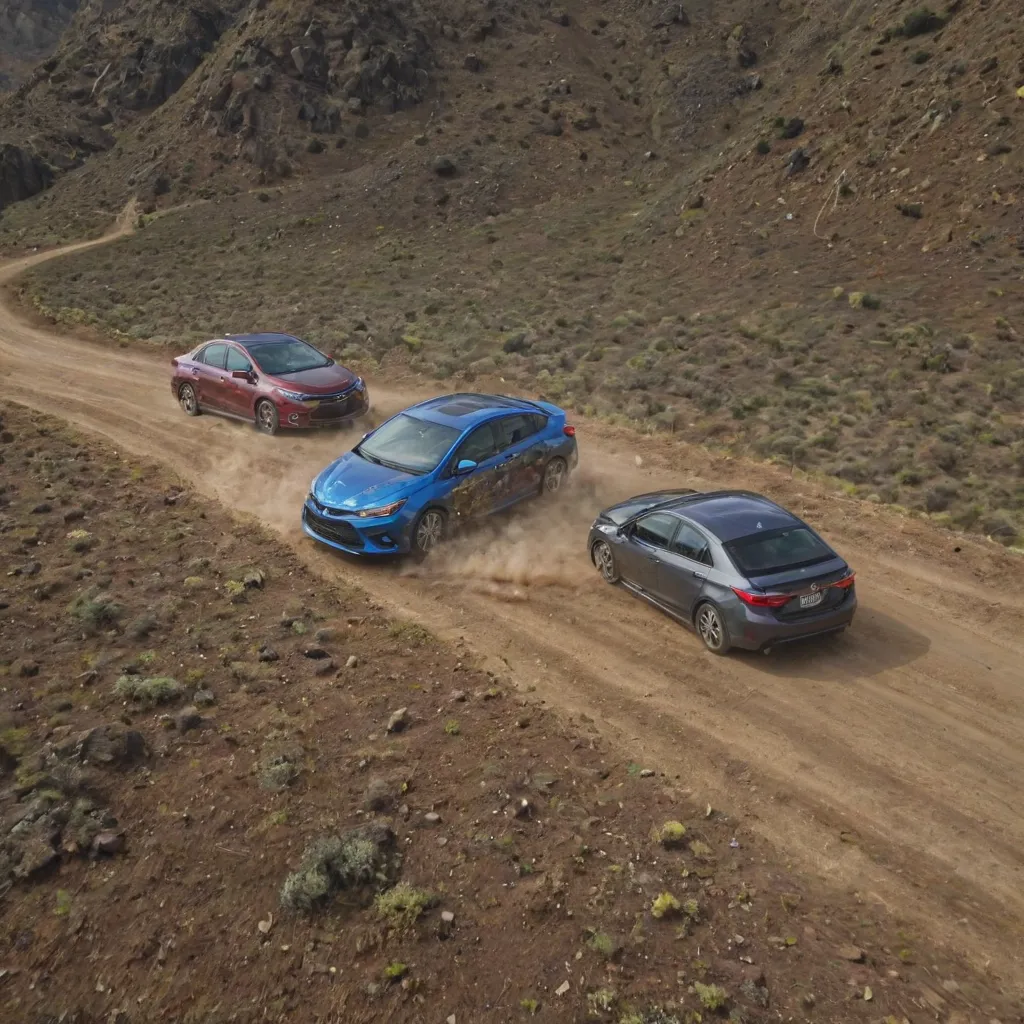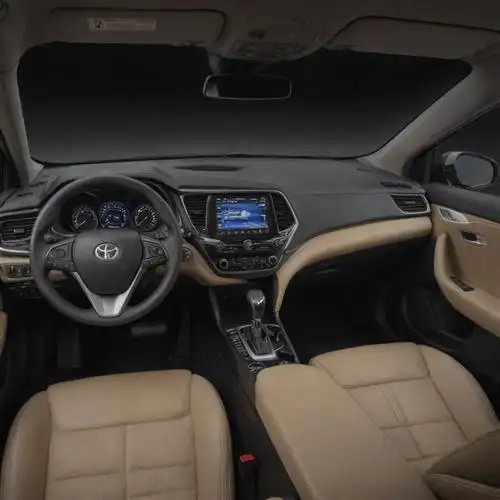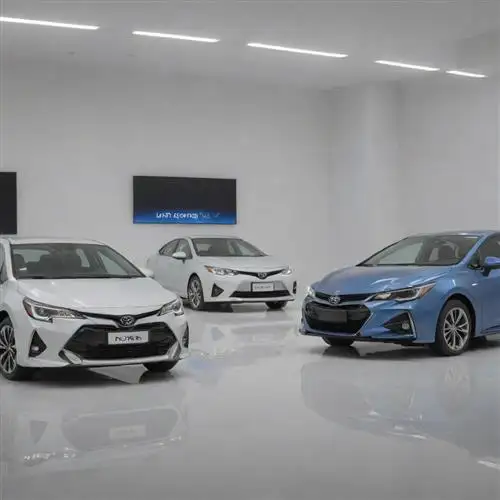
Exterior Design Comparison
Exterior Design Comparison: The Toyota Corolla and Chevrolet Cruze both boast sleek and modern designs, but they differ in their approach. The Corolla's exterior is characterized by its signature angular lines, giving it a bold and dynamic look. The front fascia features a prominent grille and sharp headlights, creating a striking presence on the road. In contrast, the Cruze takes a more subtle and refined approach, with a more streamlined silhouette and softer curves. While the Corolla aims to project a sense of power and confidence, the Cruze presents a more elegant and sophisticated aesthetic.
One notable aspect of the Corolla's exterior is its attention to detail. The vehicle's lines are meticulously crafted, creating a harmonious flow throughout the body. The available LED headlights and taillights add a touch of sophistication and enhance the car's overall visual appeal. The Corolla's aerodynamic design also contributes to its efficient performance, making it a practical choice for daily commutes and long-distance travels.
In comparison, the Cruze's exterior design places a stronger emphasis on aerodynamics, with a sleek silhouette and subtle curves that help reduce wind resistance. This design approach not only enhances the vehicle's fuel efficiency but also contributes to a quieter and more comfortable ride. The Cruze's front grille and headlight design, while more understated than the Corolla's, still manage to convey a sense of modern style.
Both the Corolla and the Cruze offer a range of trim levels and customization options, allowing buyers to tailor the exterior to their personal preferences. From bold color choices to stylish alloy wheels, each model provides opportunities for personalization. Ultimately, the choice between the Corolla's more assertive design and the Cruze's refined elegance comes down to individual taste and driving preferences.
Interior Comfort and Convenience
When comparing the Toyota Corolla and the Chevrolet Cruze, the interior comfort and convenience features are crucial considerations for many buyers. The Corolla boasts a spacious, well-designed cabin that prioritizes passenger comfort. The front seats provide ample head and legroom, ensuring a comfortable ride even on longer journeys. The rear seats offer similar levels of comfort, with a generous amount of space for adult passengers.
In contrast, the Cruze's interior, while functional, may feel slightly more cramped, particularly in the rear seating area. However, the Cruze compensates for this with a host of convenient features, such as a user-friendly infotainment system and a range of adjustable settings for the driver's seat and steering wheel.
Both vehicles offer a variety of storage solutions, with the Corolla boasting a generous trunk capacity and a selection of cubbies and compartments throughout the cabin. The Cruze matches this with its own set of storage options, including a large glovebox and door pockets capable of accommodating water bottles and other small items.
In terms of technology and convenience features, the Corolla and Cruze are evenly matched. Both offer available touch-screen infotainment systems, compatible with popular smartphone integration platforms like Apple CarPlay and Android Auto. Additionally, both vehicles can be equipped with features such as dual-zone automatic climate control, keyless entry, and push-button start.
Fuel Efficiency and Performance
Fuel Efficiency and Performance: The Toyota Corolla and the Chevrolet Cruze are both compact cars that offer impressive fuel efficiency, but their performance characteristics differ in several key areas. The Toyota Corolla, with its efficient 1.8-liter four-cylinder engine, delivers an EPA-estimated 29 miles per gallon in the city and 38 miles per gallon on the highway. This makes it a standout choice for those seeking a balance of practicality and fuel economy. The Chevrolet Cruze, on the other hand, offers a choice between a 1.4-liter turbocharged four-cylinder engine and a 1.6-liter turbodiesel engine. The turbocharged gasoline engine achieves an EPA-estimated 28 miles per gallon in the city and 38 miles per gallon on the highway, while the turbodiesel variant boasts an impressive 31 miles per gallon in the city and 48 miles per gallon on the highway, making it a compelling option for those who value maximum fuel efficiency.
When it comes to performance, the Corolla and the Cruze diverge more significantly. The Toyota Corolla's 1.8-liter engine produces 139 horsepower and 126 pound-feet of torque, which is adequate for daily driving but may feel a bit underpowered when passing or merging onto highways. In contrast, the Chevrolet Cruze's turbocharged 1.4-liter engine generates 153 horsepower and 177 pound-feet of torque, providing a more spirited driving experience. The turbodiesel Cruze, with its 137 horsepower and 240 pound-feet of torque, offers a unique blend of fuel efficiency and responsive acceleration.
Another performance factor to consider is the available transmission options. The Toyota Corolla offers a choice between a continuously variable transmission (CVT) and a six-speed manual transmission, while the Chevrolet Cruze comes with either a six-speed manual or a six-speed automatic transmission. The CVT in the Corolla is known for its smooth and efficient operation, but some drivers may prefer the more traditional feel of a conventional automatic or manual gearbox.
Safety Features and Ratings
When it comes to safety features and ratings, the Toyota Corolla and the Chevrolet Cruze are both competitive in their respective classes. The Toyota Corolla has consistently earned high safety ratings from the Insurance Institute for Highway Safety (IIHS) and the National Highway Traffic Safety Administration (NHTSA). In recent years, the Corolla has received the IIHS Top Safety Pick+ award, the organization's highest safety designation, thanks to its impressive performance in a variety of crash tests. The Corolla's standard safety features include automated emergency braking, lane departure warning, and automatic high-beam headlights, all of which contribute to its stellar safety credentials.
The Chevrolet Cruze, on the other hand, has also received strong safety ratings, although it may not quite match the Corolla's level of accolades. The Cruze has earned IIHS Top Safety Pick recognition and has received 5-star overall safety ratings from the NHTSA. Its standard safety features include a rearview camera, forward collision alert, and lane keep assist, all of which help to enhance the vehicle's safety profile. However, some of these advanced safety technologies may be optional on lower trim levels, rather than standard, as they are on the Corolla.
When it comes to occupant protection, both the Corolla and the Cruze are equipped with a comprehensive suite of airbags, including front, side, and curtain airbags, to help safeguard passengers in the event of a collision. The vehicles' robust body structures and crumple zones are also designed to absorb and dissipate the forces of an impact, helping to minimize injury to the vehicle's occupants.
Technology and Connectivity
When it comes to technology and connectivity, the Toyota Corolla and Chevrolet Cruze offer a range of features that cater to the modern driver's needs. The Toyota Corolla boasts a user-friendly infotainment system with a 7-inch touchscreen display, providing easy access to smartphone integration, navigation, and various multimedia functions. The available Entune App Suite allows Corolla drivers to seamlessly connect their mobile devices, enabling hands-free control of popular apps like Pandora, iHeartRadio, and Yelp.
In contrast, the Chevrolet Cruze offers a similar level of technology and connectivity, with a 7-inch touchscreen display and available MyLink infotainment system. This system integrates with Apple CarPlay and Android Auto, allowing users to access their smartphone's features and apps directly through the vehicle's display. Both the Corolla and Cruze offer available features like Bluetooth connectivity, voice recognition, and USB ports for charging and media playback.
One notable difference between the two vehicles is the Corolla's available Qi wireless charging feature, which allows compatible smartphones to be charged without the need for cables. This can be a convenient and clutter-free solution for drivers who frequently use their devices on the go. Additionally, the Corolla offers an available JBL premium sound system, providing a more immersive audio experience for music enthusiasts.
When it comes to safety technology, both the Toyota Corolla and Chevrolet Cruze offer a range of advanced driver-assistance features. The Corolla is available with the Toyota Safety Sense suite, which includes Lane Departure Alert, Automatic High Beams, and the Unlock Surprising Toyota Corolla Performance Secrets Pre-Collision System with Pedestrian Detection. The Cruze also offers available safety features like Forward Collision Alert and Lane Keep Assist.
In terms of connectivity, both vehicles provide 4G LTE Wi-Fi hotspot capabilities, allowing passengers to stay connected while on the road. The Corolla also offers available connected services like Toyota Safety Connect, which provides emergency assistance and stolen vehicle locator features.
















